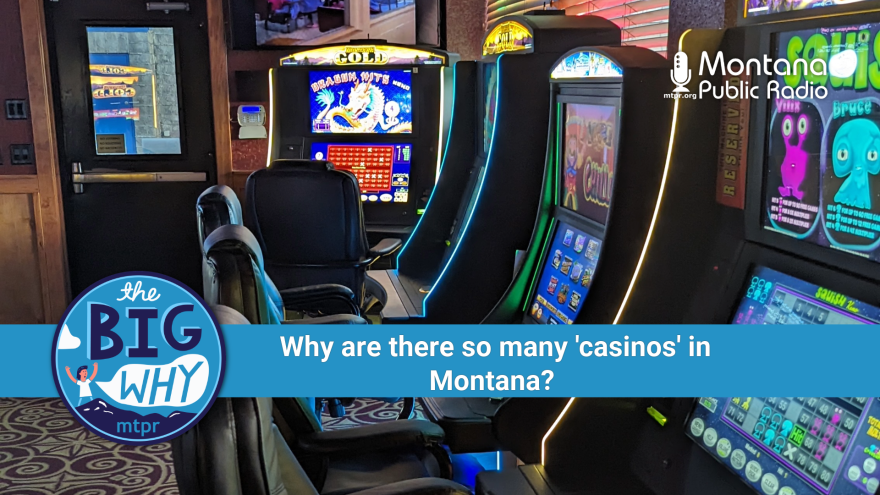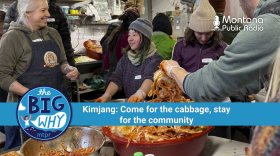This episode first aired April 24, 2024
Everywhere you look in Montana, there are places to gamble. Odds are good you've seen machines in bars, liquor stores and of course, gas stations. How did Montana end up with so many "casinos," and what does it have to do with bingo? The only sure bet is that The Big Why team has the answers.
Austin Amestoy: Welcome to The Big Why, a series from Montana Public Radio where we find out what we can discover together. I'm your host, Austin Amestoy. This is a show about listener-powered reporting. We'll answer questions, big or small, about anything under the Big Sky. By Montanans, for Montana, this is The Big Why.
For this episode our resident Buttian John Hooks is back.
John Hooks: Howdy Austin! Super excited to be back on, because we’ve got a great question this week.
Austin Amestoy: We love to hear that! What’s the question?
John Hooks: Well, we actually had a few listeners who wanted to know why are there so many casinos in Montana?
Austin Amestoy: You know, I’ve had that question myself actually.
John Hooks: I think a lot of people have, in bars, in gas stations, just about anywhere you look, there are ways to gamble in Montana. But, I have to ask, are you much of a gambler, Austin?
Austin Amestoy: I have to admit, my gambling career started and ended with a pair of scratch-off lottery tickets on my 18th birthday.
John Hooks: A classic rite of passage.
Austin Amestoy: What about you John?
John Hooks: I have a real weakness for a bit of Buffalo Keno.
Game sound effect voice: BUFFALO!
John Hooks: And for once my proclivity may actually be an asset for us here because the video keno machine is central to us answering this question.
Austin Amestoy: Alright John, I’m interested, but I have to admit I don’t even know how to play keno.
John Hooks: Not to worry, Austin. Because the rules to keno, and it’s importance to our question, both boil down to one thing.
Austin Amestoy: Oh really, and what is that?
John Hooks: Well … bingo.
Austin Amestoy: Bingo. Really? That’s not usually the first casino game I picture.
John Hooks: That’s totally fair, but before I can fully explain it, we’ve got to be clear about what we actually mean when we talk about "casinos" in Montana. And helping me out with this is John Iverson.
John Iverson: I'm the government affairs director for the Montana Tavern Association.
John Hooks: So, Austin, what do you picture when you think of the typical Montana casino?
Austin Amestoy: I just picture the big gas station Lucky Lil’s where I played those scratchers.

John Hooks: totally fair, those Town Pump casinos are definitely the most visible. But inside, there are no roulette tables or high stakes poker games right?
Austin Amestoy: No. Right, you pretty much just see stacks of machines.
John Hooks: Exactly. While there are some bigger, more traditional casinos on some of the state’s Indian reservations; for the most part, whether it's in a dark room attached to a gas station or in the corner of a local bar, when we talk about "casinos" in Montana, we’re talking about those machines.
John Iverson: In the bigger towns, you see a lot more establishments that say ‘casino’. In the smaller towns, you know, they're mostly just, the 'Montana Club' or 'the Alibi' or t'he Office' or the, you know, fill in the blank, classic Montana tavern names.
Austin Amestoy: Ahh and I’m guessing those machines are keno machines.
John Hooks: Not all, but the vast, vast majority. So to properly answer this question, we’ve got to look at how the video keno machine became so ubiquitous.
Austin Amestoy: And this brings us back to bingo?
John Hooks: It sure does, because bingo was one of the first forms of gambling legalized in Montana. See, for much of Montana history, gambling of any kind was technically illegal — although that never really stopped anyone from doing it. But the legal pathway opened after the 1972 constitutional convention.
Austin Amestoy: Oh interesting, so is gambling enshrined in the Constitution?
John Hooks: No. Gambling was authorized in a separate referendum, so not part of the Constitution, but voted on in the same election.
John Iverson: They basically said all forms of gambling are illegal, except those specifically authorized by the Legislature.
So that referendum gave lawmakers the ability to start to legalize gambling on a case-by-case basis.
Austin Amestoy: And the first one they did was bingo?
John Hooks: Yep, which maybe doesn't seem like the obvious top priority, but if you think about church groups or social clubs that want to have a bingo night with a pot of money, those are technically forms of gambling, so they got legalized first.
Austin Amestoy: Yeah that makes sense. So how do we get from bingo to keno?
John Hooks: Well, that’s because keno is technically a form of bingo.
Sound: John at the keno machine putting in five dollars.
Before video machines you had live keno, where there’s one big board for everyone that’s numbered one through 80, and you pick your numbers
Sound: John picking numbers.
And there’s an operator spinning one of those cages, picking out numbered balls. And the more of your numbers that are picked, the more you win
Sound: John saying 'Oh, quick one dollar win'.
… or lose
Sound John: 'And I have lost my five dollars.'
John Hooks: So at the core, both games are centered on choosing numbers off a board and hoping yours get picked.
Austin Amestoy: OK, great John, I think I understand the keno-bingo connection. Where do the video machines come in?
John Hooks: The video machine enters after 1976, when the Montana Supreme Court decided that video keno was close enough to bingo to be good to go in Montana.
A few years later, Montana allowed any business with a liquor license to add 20 keno machines, as long as they paid an annual license fee for each machine.
Austin Amestoy: So that's how the keno machine found its way to nearly every bar in Montana?

John Hooks: Yeah, pretty much. And since then, there's been a steady increase in games allowed on those machines, as well as the recent introduction of sports betting through the Montana Lottery.
Austin Amestoy: But I want to dig into the profit side a bit, because I feel like we’ve got to the how of answering this question but the money is the why. How much money do these machines make?
John Hooks: So let's look at it in terms of the five dollars I lost earlier. After the license fee, the state takes 15% of a machine’s income. So Lucky Lil's got to keep nearly $4.50 of my $5.00.
Austin Amestoy: That’s not a bad deal, do we know what that comes out to over a year?
John Hooks: In the Justice Department’s latest numbers, for 2022, the average gross income on a single video machine was over $28,000 a year.
Austin Amestoy: Oh wow! And if you’ve got 20 machines going that’s a ton of money.
John Hooks: for sure. But the vast majority of ‘casinos’ in Montana are not maxing out to 20 machines, they’re small, local bars with a handful of machines in the corner. And for a lot of those places, especially out in rural Montana. The profit off those keno machines is vital.
John Iverson: You know, one of the things we like to say at the MTA is that a tavern was likely the first main street business in that town. And unfortunately, in too many of these towns, it's the last main street business left. And the gaming revenue that comes in, in these small owner/operator establishments, is critical to keep these places afloat.
Austin Amestoy: John, thanks for the Montana gambling deep-dive.
John Hooks: Thanks Austin, And before we go, it’s important to note here that with gambling there’s going to be people who have problems with gambling. The Montana Council on Problem Gambling is an organization that connects folks to resources for those issues. Call 888-900-9979.
Austin Amestoy: A very important note indeed.
Now we want to know what makes you curious about Montana. Submit your questions below. Find us wherever you listen to podcasts and help others find the show by sharing it and leaving a review. Let's see what we can discover together!
-
How do cabbage and spices become ingredients for community building? In Korea, the answer is kimjang, the fall tradition of making and sharing kimchi. This week on The Big Why, we visit a farm in the Bitterroot Valley where a group of Montanans came together to keep a food custom alive and find comfort and connection among the cabbage.
-
In Montana, abortion access has been at times illegal, legal, and stuck in limbo. Providers have weathered bombings and arson, advocates and opponents have battled it out in court, and citizens have passed a constitutional amendment affirming a woman's right to choose. One listener wants to know more about the history of reproductive rights in Montana. MTPR's Aaron Bolton reports on the underground networks, political violence and landmark court cases that got us to where we are today.
-
A flag's primary purpose is to be recognized from a distance. That means few colors, no lettering and a clear distinction from other flags. Ideally, it should be simple enough for a child to draw it from memory. So, how did Montana end up with such a complicated flag? Learn more in this episode of The Big Why.
-
This week on The Big Why, we’re exploring Montana’s 56 counties. A listener from Billings wants to know how they got their shapes. Finding the answer led MTPR's Austin Amestoy down a rabbit hole where he found a saga of boom and bust, backroom dealing and an unlikely folk hero.
-
This week: A second edition of "The Little Why," where we tackle questions from our younger listeners. Saddle up, grab the reins and ride along with us as we learn about wild horses in Montana.









